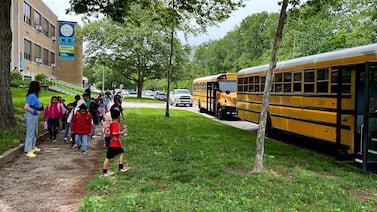Tennessee’s high school graduation rate has returned to pre-pandemic levels — and even slightly exceeded the state’s previous peak three years earlier, according to new data released Wednesday.
About 89.8% of public school students in the Class of 2022 graduated on time this spring, more than 1 percentage point better than the previous year, the state education department reported.
The previous high of 89.7% occurred with the Class of 2019, the year before the pandemic hit.
The bounceback is encouraging news after a three-year slide pulled back on nearly a decade of incremental increases totaling more than 4 percentage points under a workforce and economic development initiative prioritized by former Gov. Bill Haslam.
The latest numbers also add to evidence that Tennessee public education is recovering from a pandemic that rocked school communities and continues to complicate teaching and learning.
In June, Tennessee reported that student scores on state tests improved across all subjects and grades, largely returning to pre-COVID levels.
In a statement on Wednesday, Education Commissioner Penny Schwinn credited educators and families for positioning this year’s nearly 65,000 high school graduates to “achieve their dreams and goals.”
According to the U.S. Labor Department, a person with a high school diploma is likely to earn 40% more income over a lifetime than someone without one, and has a 33% greater chance of being employed.
They can earn even more with a post-secondary credential or degree. But mirroring national trends, Tennessee’s college-going rate declined during the pandemic, worsening a five-year trend that higher education officials have called a crisis.
The state’s college-going rate dropped 9 percentage points to 52.8% between the Class of 2019 and the Class of 2021, according to a recent report by the Tennessee Higher Education Commission.
The commission has been working on strategies to reverse that trend. But more students earning their high school diplomas is a good start.
According to the education department, more than half of Tennessee’s 147 school districts improved their graduation rates from 2021 to 2022, including two of the state’s four largest districts.
The rate for Memphis-Shelby County Schools rose by 2.4 percentage points to 80.1%, the highest since the 2013 merger of city and county schools. Hamilton County Schools increased its rate by 3.2 percentage points to 88.7%.
Graduation rates dipped slightly for Metro Nashville Public Schools (81.6%) and Knox County Schools (89.7%).
For more information on high school graduation rates for individual districts and schools, visit the education department’s website.
This story has been updated with additional details.
Marta W. Aldrich is a senior correspondent and covers the statehouse for Chalkbeat Tennessee. Contact her at maldrich@chalkbeat.org.






